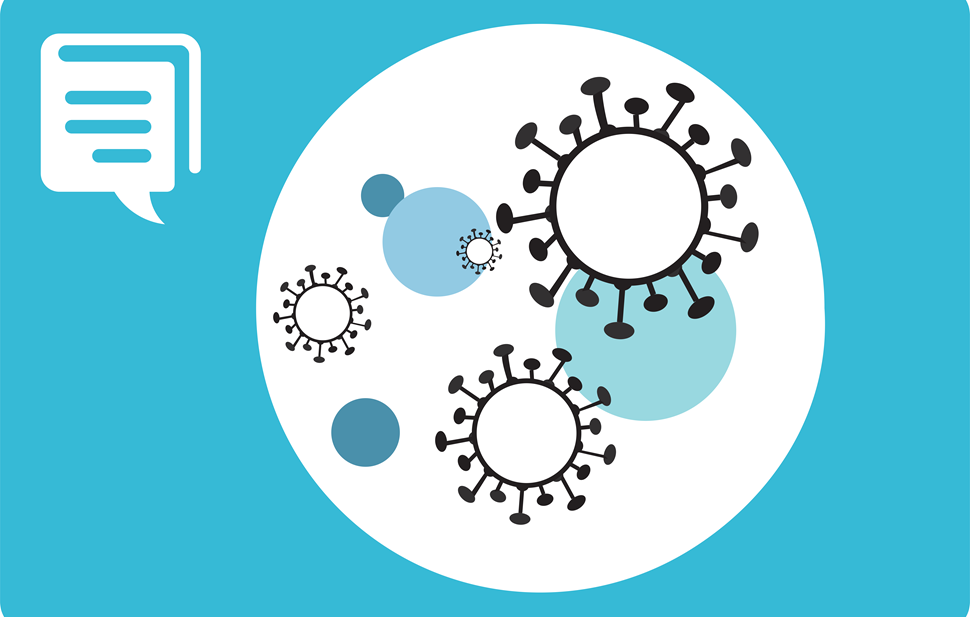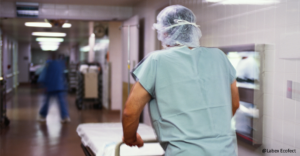The scientific research sector in France is currently facing the COVID-19 pandemic. Here is a snapshot of what is going on.
24/04/2020
The Institut Pasteur has conducted an epidemiology study on 661 people with a link to a high school in Crépy-en-Valois, Northern France. They found that 26% of the studied population had had the virus and has antibodies against it. 41% of those going to the high school (students, teachers, staff) and 11% of those around them had had the virus. The population was rather young (with a median age of 37), and only 5,3% of those infected were hospitalized, none of them were deceased. The most reliable symptoms for diagnosis appeared to be loss of sense of smell and taste. Almost 1 out of 5 of those infected had no symptoms at all, and smokers appear to have been less infected than non smokers. Details of study are available here.
23/04/2020
In a CNRS Podcast, historian Clyde Plumauzille recalls the dynamics which led to women being in charge of most of the care work in society, and how the current crisis impacts them disproportionately.
The Engineering and Mechanics Institute of Bordeaux developed a new close system tracheal valve (a piece for respirators) after the Bordeaux University Hospital alterted that they needed those valves, not currently available on the market. This was done in partnership with the industry, which enabled the valves to be produced in factories two weeks into the process only. More info.
The French Minisitry for Research, Higher Education and Innovation has announced measures to mitigate the effect of the current outbreak on research through a press release on April 23. The aim is to hinder the consequences of the epidemic in particular for young researchers.
For young researchers completing a PHD whose work has been stopped by the epidemic, they will be offered a contract extension of up to one year. All the PHD students will qualify for this measure, the ones under a state funding as well as the ones under private funding (CIFRE thesis contract). The institutions will also pay a particular attention to postdoctoral researchers and engineers, researchers and technical personals under fixed-term contract.
Last, regarding research projects funded by the French National Research Agency, all the agreements will be extended with additional funding when necessary. Last, the unused funding for year 2020 will be reported on the year 2021.
17/04/2020
The French National Research Agency (ANR) opened a new call after the broad mobilisation of the scientific community on the first Flash Call on Covid-19 which saw the selection of 86 research projects. This new call aims at fostering project on Covid-19 that could be implemented within 3 to 12 months. The submission of project proposal will be open from April 20 to October 28, the total funding available is of 14,5 million euros with a maximum of 150 000 € per project. The scope of the call includes : Epidemiological studies, Physiopathogeny of the disease, Infection prevention and control, Ethics and Social Dynamics, Global challenges of the Covid-19 epidemic in accordance with the World Health Organizations recommendations.
21/04/2020
A team of French researchers (from Inserm, Institut Pasteur and CNRS) has published a first statistic study about the range of the epidemic in France. The study also aims at assessing the effects of the quarantine in France as well as evaluating the level of collective humanity on May 11th, the announced date of the progressive opening of the country. With data from the hospitals they built statistic model to estimate the contamination rate – R – and the number of cases. They conclude estimating that on may 11, around 5% of the population will have been infected thus not allowing to consider herd immunity as a solution in a near future. They also show that the quarantine succeeded to make the R drop from 3.3 to 0.5.
The «Discovery» clinical trial for the treatment of COVID-19 was initiated on Sunday March 22, 2020 in Lyon. It is a real-time, adaptive clinical trial, which will test four different treatments against Covid-19 and will enroll 800 patients in France and a total of 3,200 patients across Europe, with trial sites in Belgium, Holland, Germany, Spain and England. The protocol of the trial, coordinated by the national agency for medical research INSERM, was implemented in record time by clinicians and researchers from the REACTing (REsearch and ACtion targeting emerging infectious diseases) consortium led by the World Health Organization.
The French coordinators of the Discovery clinical trial are Professor Yazdan Yazdanpanah’s at the Bichat Hospital in Paris (Assistance Publique des Hôpitaux de Paris – APHP), and Professor Florence Ader and Professor Bruno Lina’s from respectively the Croix-Rousse Hospital in Lyon and the Hospices Civils of Lyon. The city of Lyon, home of the Jean Mérieux INSERM P4 lab, has a long tradition of research in infectious diseases; it hosts the national Laboratory of Excellence (LabEx) EcoFect, dedicated to the study of infectious diseases.
14/04/2020
The Cité des sciences et de l’industrie published a clear and straight foward video on the meaning of the COVID-19 figures we read about, as part of their Data science versus Fake project. Video.
The French government a call to support corporations and public partners doing clinical trials in France for potential COVID-19 cures or preventive therapeutic solutions. The financial support could reach 50 million euros per project. More info.
The French National institute for demographic studies (INED) created a website to publish their data on COVID-19-related deaths. Website.
The CIRAD (International cooperation center for agronomy research for development) is coordinating the MOOD research project (MOOD : MOnitoring Outbreak events for Disease surveillance in data science context), awarded a European H2020 grant of 14 million euros and bringing together 25 partners from 12 countries. This research project aims to improve epidemic intelligence tools and services. More info.
The CEPI (Coalition for Epidemic Preparedness Innovations) allocated 4,3 million US dollars to a consortium led by the Institut Pasteur and including Themis and the University of Pittsbrugh to develop a COVID-19 vaccine based on measles-vector technology. More info.
Following a call by the French National Research Agengy (ANR), 86 research projects have been selected with a total fund of 14,5 million euros. The call remains open. List of projects.
08/04/2020
With 55 000 missions per year in almost every country of the world, researchers working for the French National Scientific Research Centre (CNRS) are facing challenges linked with the pandemic. The Head of Safety shared how the crisis is being managed, from a census of researchers in short-term missions abroad to the repatriation of a few hundred agents. More info.
07/04/2020
The French government announced a 50 million euros emergency fund for COVID-19 related research. More info.
06/04/2020
The French government wants all scientific publications and data related to COVID-19 to be in open access. More info.
French researcher and biostatistician France Mentré is project leader for one research project devoted to fighting COVID-19. Her team will follow a large group of patients in France. She wants to identify indicators to help understand in the first days of infection which patients will get accute symptoms. They will also follow patients whose immunity systems have efficiently developed a response to the disease, in order to study the evolution of the disease. More info.
01/04/2020
A team of French scientists led by Philippe Cinquin is researching how to reuse surgical and FFP2 masks. In collaboration with a hospital in Grenoble, they are trying different ways to clean and decontaminate masks while preserving their efficient protection, so they can be worn several times by healthcare professionals. More info.
Three experts from the French National Scientific Research Center explain how epidemic models are made. Macroscopic models (at the scale of a society) consider three main factors: the number of contacts between healthy and infected individuals, the ease with which the virus is transmitted during those contacts, and the amount of time during which patients are infectious. They underline the importance of the rate at which the virus is spread (how many individuals will one infected individual share the virus with), R(0). More info.
Sociologist Dominique Wolton warns that there might be misplaced trust in scientists right now. He recalls that in the absence of absolute truth (science is plural and the virus is new), decision-making involves responsibility and is the job of politicians. He fears that as a consequence, this situation could result in a decline of trust in scientists soon. More info.
According to Professor Rodolphe Gozlan of the Research Institute for Development, an epidemic such as the COVID-19 epidemic was an unavoidable consequence of our environmental impact. In the last 40 years, 70% of infections have been transmitted to humans by animals. When the impact of humans on the natural habitats of these animals (such as deforestation but also changing of climate conditions or introduction of new species) is high, the risks of infected animals and humans meeting increases accordingly. We disrupt ecosystems, which include large reservoirs of pathogens. More info.
Doctor Jean-François Chambon from the Institut Pasteur believes that thanks to the mediatized competition between laboratories all around the world to find treatements and vaccines against COVID-19, and to open science and especially international databases. «Research made as much progess in 4 weeks as it did in 4 years against AIDS». More info.
27/03/2020
The French National Research Agency (ANR) closed this week a call for teams ready to work on COVID-19, with a starting budget of 3 million euros. They received many more applications than expected. Funds are being unlocked without delay for 44 urgent projets. More info.
In February 2020, the European Union Framework program for research and innovation launched an exceptional short-term call to fund work on COVID-19, thanks to a specific budget planned in case of a public health emergency. 8 of the 17 selected projects include French research teams, and 1 is coordinated by a French lab. More info.
With the financial support of the French Ministry of health and solidarity and the French Ministry of higher education, research and innovation, 20 research projects have been selected for funding by the scientific consortium REsearch and ACTion targeting emerging infectious diseases (REACTing) lead by the National institute for health and medical research (Inserm). More info.
A scientific council has been put in place to advice the government on coronavirus measures in France, and their recommandations are made public. More info.
The Sanofi pharmaceutical lab is uniting with their US counterpart Regeneron to test whether their medicine Kevzara is efficient for treatment of patients hospitalized with heavy symptoms. Clinical trials are starting in New York, which is at the epicenter of the epidemic in the USA. More info.
The Institut Pasteur, a French non-profit public health foundation is using its network of 33 institutes throughout the world to help flight the pandemic. In the Central African Republic, the Institut Pasteur in Bangui is at the heart of the COVID-19 fight in the Central African Republic. More info.

